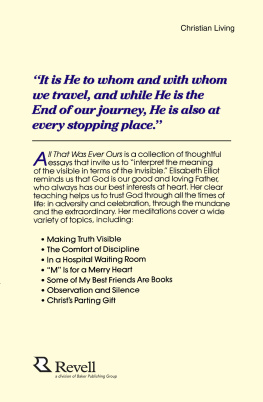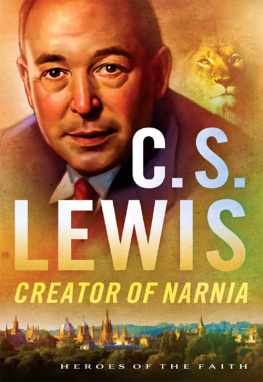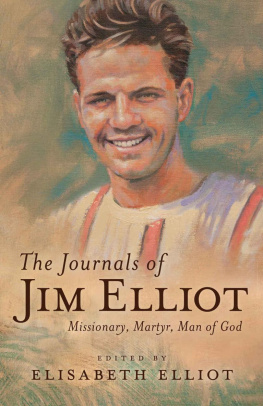
1996 by Barbour Publishing, Inc.
Print ISBN 978-1-62029-712-4
eBook Editions:
Adobe Digital Edition (.epub) 978-1-62416-076-9
Kindle and MobiPocket Edition (.prc) 978-1-62416-075-2
All rights reserved. No part of this publication may be reproduced or transmitted for commercial purposes, except for brief quotations in printed reviews, without written permission of the publisher.
Churches and other noncommercial interests may reproduce portions of this book without the express written permission of Barbour Publishing, provided that the text does not exceed 500 words and that the text is not material quoted from another publisher. When reproducing text from this book, include the following credit line: From Jim Elliot, published by Barbour Publishing, Inc. Used by permission.
All scripture quotations, unless otherwise noted, are taken from the King James Version of the Bible.
Cover; illustration: Greg Copeland; Cover design: Kirk DouPonce
Published by Barbour Publishing, Inc., P.O. Box 719, Uhrichsville, Ohio 44683, www.barbourbooks.com
Our mission is to publish and distribute inspirational products offering exceptional value and biblical encouragement to the masses.

Printed in the United States of America.
INTRODUCTION
What does God want me to do?
The people of God have been asking this question for thousands of years.
For a few, the answer comes quickly and clearly, and they respond with a certainty of conviction that befuddles friends and family. For many others, Gods leading is a bit foggy, if not downright obscure at times. This is why How to Know the Will of God is a topic that draws an eager crowd whenever a seminar or class is offered. But can it really be reduced to a step-by-step process?
We can ponder the question philosophically and reason that what God wants most from us is a commitment to live lives that demonstrate His love and draw other people to Him. As long as what we do does not contradict the truth God has revealed in the Bible, whatever decisions we make will please God. We can choose freely where to go to school, whom to marry, what career to pursue, where to live, and so forth. Admittedly, in certain instances we may have a sense of specific leading toward a particular decision. When that happens, we should follow that leading. But that does not always happen, so in general, we can please and serve God in whatever decisions we make.
We can also stand at the other end of the spectrum and argue that God has a specific plan for each one of us. At every decision point, we should find out Gods will in that circumstance and do it. Whom to marry, where to work, when to change jobs or begin a new ministryGod has a specific answer to every question. And His answer may not be the most obvious or easiest choice. We must be careful to find Gods will objectively and not be influenced by circumstances, pressing needs, or emotion. It is better to do nothing than to take action without being sure of Gods leading.
THE STORY OF JIM ELLIOTS BRIEF ADULT LIFE IS AN ACCOUNT OF HOW HE HEARD AND RESPONDED TO GODS VOICE.
This theological diversity may not be the only factor that influences how we respond to the question, What does God want me to do? Personality enters in. God did not create us all alike. Neither does the redemptive process make us all alike. Even when united by a desire to serve God, we remain different from each other, with individual differences and abilities. Some people leap at the chance to do something daring, while others cautiously stick to the sensible. Some move from one thing to another as their interests change, while others dedicate decades to a single purpose. Some respond wholeheartedly to the stimulation of life and people around them, while others keep aloof, afraid of compromising their beliefs somehow. Some make up their own minds, while others are influenced by persuasive talk. These differences do not diminish the common motive to do what God wants us to do.
God is not limited by our personalitiesHe created them. Neither is He limited by theological inclinationsHe can change those. No matter where we stand individually on the continuums of theology and personality, Gods people want to listen to His voice.
The story of Jim Elliots brief adult life is an account of how he heard and responded to Gods voice. Though not all will agree with his interpretations, his story is an exploration of one persons understanding of the will of God. Most likely his personality affected his interpretations as much as his theology did. This resulted in an amazing singleness of purpose for his own life. In addition, because he was not hesitant to act publicly on his convictions, his singleness of purpose swept up several other people and their families.
Onlookers five decades after his death may speculate about how Jims lifeand the lives of others he worked withmight have been different if he had made other decisions at key turning points. Would other decisions have been right, wrong, or simply different?
Following the will of God is not a foolproof process. Even missionaries like Jim Elliot are human and fallible. But no matter what our choices, and no matter what motivates them, God is powerful enough to bring good where His children can see none.
THE LIFE OF JIM ELLIOT
October 1927: Jim Elliot is born in Oregon
September 1945: Jim enters Wheaton College in Wheaton, Illinois
December 1946: Jim attends an InterVarsity mission conference in Toronto, Canada
Summer 1947: Jim goes on a mission trip to Mexico and begins to focus interest on Latin America
December 1947: Jim spends Christmas holidays with the Howard family in New Jersey
May 1948: Jim and Elisabeth realize they love each other
June 1948: Elisabeth graduates from college
September 1948: Jim and Elisabeth visit each other in Wheaton
October 1948: Jim and Elisabeth begin corresponding
December 1948: Jim attends second InterVarsity mission conference in Urbana, Illinois
Spring 1949: Jim undergoes a renaissance and challenges Ed McCully to be a missionary
June 1949: Jim graduates from Wheaton and returns to Portland, Oregon
September 1949: Elisabeth visits the Elliot family in Portland
Summer 1950: Jim attends linguistic training in Oklahoma; David Howard gets married; Jim commits to going to Ecuador
Fall 1950: Ed McCully decides to leave law school and consider missionary work
January 1951: Jim begins ministry in Chester, Illinois, with Ed June 1951: Ed marries Marilou, and Bill Cathers marries Irene; Jim returns to Oregon
February 1952: Jim and Pete Fleming arrive in Ecuador
April 1952: Elisabeth arrives in Ecuador
August 1952: Jim and Pete finish language study and go to the Shandia mission station
December 1952: Ed and Marilou McCully arrive in Ecuador
February 1953: First Quichua Bible Conference
July 1953: Flood at Shandia destroys a years work
October 1953: Jim and Elisabeth get married in Quito and move to Puyupungu to establish a new station
February 1954: Second Quichua Bible Conference
June 1954: Jim and Elisabeth move to Shandia
February 1955: Jim and Elisabeths daughter, Valerie, is born at Shell Mera
September 1955: Nate Saint and Ed McCully see Auca villages for the first time
















